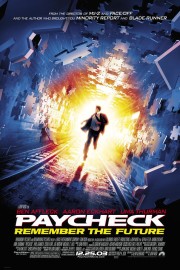Paycheck
In his four-decade career as a director, John Woo spent one of those in America. After “The Killer” and “Hard-Boiled,” he was a very hot commodity as an action director, so it was inevitable that Hollywood would come knocking, since his work hit specifically on genre conventions while also deepening them with complex morality tales. In that decade, he did some Canadian productions and produced some American films in addition to the six Hollywood films he directed. While he had big hits in “Face/Off” and “Mission: Impossible 2,” his work was definitely lacking in the energy and innovation of his Hong Kong work. He then returned to China, where he made the epic, fantastic “Red Cliff.” Hopefully, he’ll find his was back to Hollywood, and people who support his distinctive vision, but for now, I will take what I can get.
His last American film was “Paycheck,” a thriller based on a short story by Philip K. Dick, whose work had just been turned into Steven Spielberg’s brilliant “Minority Report.” “Paycheck” is not “Minority Report,” although it’s not the failure it’s lackluster box-office implies. After 9/11, Woo swore off action movies such as the ones he built his reputation on, and indeed, “Paycheck” is very much a Hitchcockian exercise of suspense and the Master of Suspense’s favorite story, of an innocent man, falsely accused. That doesn’t quite sum up the film’s twisting narrative, but it’s very much the spirit of Woo’s film, which uses “North By Northwest” as it’s template. This is not “North By Northwest,” but it’s also not a tired retread of cliches, either; Woo makes this film his own.
As Woo’s Cary Grant, we have Ben Affleck as Michael Jennings, a technological engineer who does very specific work for companies– he breaks down existing technology, improves on it, and companies then own the intellectual and physical properties that made it possible, and Jennings gets paid. His usual jobs last two months, and there’s a catch…his memory is wiped at the end of it, erasing any trace he ever worked for the company. When an old friend who is the head of a Fortune 500 company (Rethrick, played by Aaron Eckhart) comes calling for his services, the job is for considerably longer (three years), but the pay is beyond what he’s ever gotten before– he wouldn’t have to work again. After three years, his memory is wiped, and he’s ready to move on; however, when he tries to collect his money, he’s forfeited everything, and the envelope of his belongings don’t look familiar. Something isn’t right, so now he has to reverse engineer the last three years to find out what’s happening. Unfortunately, his work now has not only Rethrick wanting him dead, but the FBI on his tail. Maybe his friend who usually does his memory wipes (Shorty, played by Paul Giamatti), or a botanist who works for Rethrick (Rachel, played by Uma Thurman) can help him find the answers he needs.
If nothing else, “Paycheck” shows that Woo is more than just a guy who makes over-the-top action movies– he’s also a sharp, smart storyteller who can adapt to any genre. He works from a script by Dean Georgaris that hits all of the conspiracy Hitchcock thriller buttons while also giving Woo some latitude to flex his action director muscles when Jennings is on the run. Woo is completely comfortable with what he’s doing in this film, and he has collaborators (his long-time producer, Terrence Chang, his “M:i-2” cinematographer Jeffrey Kimball and “Face/Off” composer John Powell) who understand his thought process as a filmmaker and will give him what he’s looking for so he can focus on the story, and a cast that gets a kick working with him, even if they aren’t exactly on their A-game (released two months after “Kill Bill: Vol. 1,” this was a major step back for Thurman). This isn’t the self-parody John Woo that directed “M:i-2” but the Woo who loves classic Hollywood genre, who brings an appreciation for certain tropes and rhythms to his storytelling palette that gives us something new and entertaining. Is it great Woo cinema? No, but it is fun to watch if you don’t really think about it, and relax.










